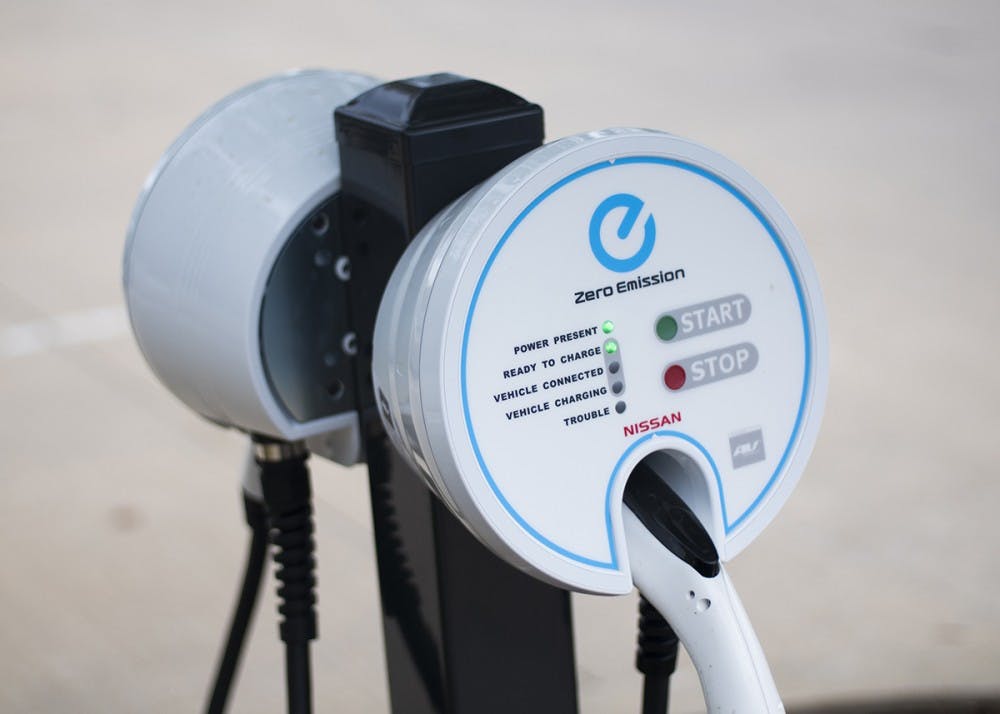An IU engineer who has driven a Chevrolet Volt for four years said it’s more fun to drive his car on battery than on gasoline.
For IU employees, like network engineer John Stigall, who have electric vehicles, IU Parking Operations has installed two electric vehicle chargers. They are located at the Cyberinfrastructure Building. The electric vehicle chargers are part of a pilot program that introduces them to the campus. The chargers went online about two weeks ago.
Kevin Whited, transportation demand management coordinator, said the installation of electric vehicle charging stations was a project that had been considered by his predecessor. Whited said when he started his job in July 2017, the project stood out to him.
“I think you’re going to start seeing a bigger demand for electric cars,” Whited said, adding that many countries are looking to ban internal combustion engines. Among these are France, Norway and India.
Extending wires from a pre-existing building to a parking lot is the most expensive part of installing electric vehicle chargers, Whited said. The Cyberinfrastructure Building was chosen because it was pre-wired to support electric vehicle chargers.
Because the Cyberinfrastructure Building was pre-wired, the project went from a cost of around $30,000 to $6,000 and was completed quickly.
“It was a low-hanging fruit, and bam – done,” Whited said.
After six months, IU Parking Operations will evaluate how often people use them and how satisfied people are with them, Whited said.
IU Parking Operations looks to install these electric chargers in parking garages, Whited said. These structures already have electricity running to them, so only the wiring for the chargers would be added, which would make installation cheaper.
Whited said they are installing the wiring for electric vehicle chargers during construction of the new parking garage on the corner of 11th Street and North Woodlawn Avenue.
If they installed electric vehicle chargers at another building they would have to dig up a lot of ground, which would increase the cost, Whited said.
Whited said IU bought “dumb” chargers that do not show how much the car has charged. However, this makes them more cost-efficient because most cars already have software that allows the owner to check how much it has charged.
There are three different grades of electric chargers. The grades range from level one to three, increasing in price and charging voltage as the level goes up, Whited said. The chargers Parking Operations has installed are level-two chargers, which cost between $600 to $700 each. These chargers take two to three hours to fully charge a car that is at 20 percent battery.
Stigall said he thinks it is important IU is installing these chargers.
“It’s kind of a cart-and-horse thing,” Stigall said. “If you don’t have these stations, you’re not encouraging people to drive electric cars.”
These spots are only available for IU faculty and staff, and an extra permit is required to access the spots for a $36 fee or $3 per month.
“At IU, since we are a state organization, we can’t give electricity away for free,” Whited said, adding that electricity is state property.
Stigall said he has used the charging station several times before leaving the Cyberinfrastructure Building, and Daniel Calarco, chief of staff at the Office of the Vice President for Information Technology, said he uses the charging station about twice a week because he makes trips between Indianapolis and Bloomington.
“Knowing that there are places to charge on or near both Bloomington and IUPUI campuses means that I can feel confident that I can drive to work and not have to worry about getting stranded,” Calarco said.




